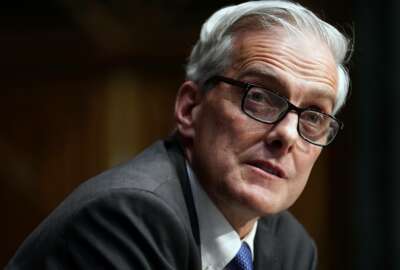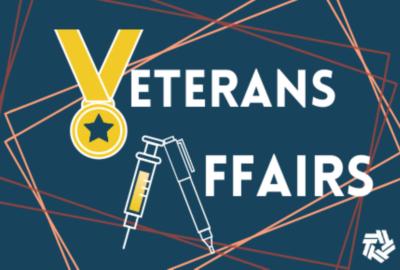Sweeping VA reform bill with pay flexibility for health care workers passes House
Lawmakers axed language in the House-passed Dole Act that set higher standards for the VA to resume the rollout of its troubled new Electronic Health Record.
A bipartisan bill with an extensive list of changes to how the Department of Veterans Affairs delivers health care and benefits is one step closer to becoming law.
The House passed the Sen. Elizabeth Dole 21st Century Veterans Health Care and Benefits Improvement Act in a floor vote Monday evening.
The omnibus legislation pulls together several bills that lawmakers introduced this session of Congress.
Among its provisions, the Dole Act would expand pay flexibilities for some VA health care workers, and would set new standards for how the VA provides care to veterans.
House VA Committee Chairman Mike Bost (R-Ill.) said the bill upholds the 2018 MISSION Act, which expanded veterans’ eligibility for non-VA community care, and ensures they have “access to timely health care they want and where they want it.”
“The Dole Act would help deliver on the promises we have made to the veterans and their families. Some of the provisions in the Dole Act would quite literally save veterans’ lives,” Bost said on the House floor on Monday.
The bill would also require the VA to develop a plan to expand same-day scheduling for medical appointments.
The Dole Act requires each VA physician, podiatrist, optometrist and dentist to receive an annual pay evaluation, and would give VA more flexibility to offer pay awards, as well as recruitment, retention and relocation bonuses to these health care workers.
The VA would have to give Congress an annual report on the outcome of these pay evaluations, and all resulting market pay adjustments.
The Dole Act would also give the VA the authority to pay retroactive compensation to health care employees who exceeded annual pay caps between Jan. 8, 2006, and Dec. 31, 2017.
The bill would allow the VA to waive pay limitations for up to 300 personnel, “if deemed necessary for the recruitment or retention of critical health care personnel.”
The Dole Act would also require the VA to develop staffing models for its Office of Integrated Veteran Care, Veterans Integrated Services Networks (VISNs), and VA medical centers that will allow the department to “ensure timely access to care and to effectively oversee the provision of care.”
The VA would also have to submit annual reports to Congress and the Government Accountability Office on its efforts to meet these staffing targets.
The VA says it’s delivering more health care and benefits to more veterans than ever before, breaking previous records.
The department is seeing this record workload under the 2022 PACT Act, which expands health care and benefits for veterans exposed to toxic substances during their military service.
The Veterans Health Administration hired more than 61,000 employees in fiscal 2023 — its fastest rate of growth in 15 years — but pursued a “net-zero growth” model in FY 2024 in anticipation of budget constraints.
Despite that belt-tightening, the VA is looking to add 5,000 positions to its health care workforce by the end of this year.
The Dole Act would require the VA to incorporate performance metrics and accountability measures within performance appraisals for VA employees responsible for providing timely access to care.
The bill requires the VA to develop a strategic plan to implement “value-based care” that focuses on quality, provider performance and patient experience. That plan would include an assessment of the VA’s IT infrastructure and workforce challenges.
Following the report’s release, the department would launch a three-year pilot of value-based care across its primary care, mental health and substance abuse services.
The Dole Act would require all new VA employees to receive training from the VA’s inspector general’s office on reporting wrongdoing.
No VA EHR ‘guardrails’ in final bill
Lawmakers negotiated over several portions of the final bill before putting it for a floor vote. The version passed by the House no longer includes the RESET Act, a bipartisan bill that would have kept the VA from rolling out a new Electronic Health Record at more of its facilities, until the six VA sites already using the new system meet certain performance standards.
Ranking Member Mark Takano (D-Calif.) expressed concern that the final bill does not include “much-needed guardrails” on the VA’s troubled rollout of the Oracle-Cerner EHR.
“It’s no secret that the Oracle-driven modernization effort has struggled at VA,” Takano said.
The Defense Department this year completed its rollout of the same Oracle Cerner EHR, which it calls MHS Genesis. But the VA has only deployed the Oracle-Cerner system to six of its 172 medical centers.
The VA paused all future deployments of the Oracle-Cerner EHR in April 2023 to address persistent problems reported by VA employees at facilities already using the new system.
The VA inspector general’s office has found the new EHR led to patient safety issues, while lawmakers say the system contributed to the deaths of several veterans.
Takano said the EHR rollout at the VA is “woefully behind schedule,” and that having the standards outlined in the RESET Act “would have prevented many of the current problems” the VA is experiencing with the system.
“I’m not convinced the system is fully functional,” Takano said.
The RESET Act would have also improved EHR coordination between DoD and VA, and instituted major contracting and acquisition reforms over VA’s IT modernization efforts that are long overdue.
Despite these changes, Takano said the Dole Act “achieves progress on many of the goals we set out to accomplish at the beginning of the 118th Congress.”
The Dole Act reauthorizes and funds the VA’s VET-TEC program through September 2027, and would allow up to 4,000 veterans to enroll in the program each year.
The VET-TEC program places veterans into training to learn IT skills, or to start or advance tech careers. The VET-TEC program started a five-year pilot.
The VA stopped accepting new applications in April 2024. The program has an 84% graduation rate for the 12,000 veterans who have already completed training.
The Dole Act directs the Interior Department to launch its own pilot program to hire veterans in conservation and resource management positions.
The legislation also gives aging and disabled veterans more options to remain in their homes, and avoid or delay admission to a nursing home assistive living facility. It expands veterans’ access to home- and community-based services, including home health aides.
The Dole Act also increases funding for VA programs that assist veterans experiencing homelessness.
Copyright © 2025 Federal News Network. All rights reserved. This website is not intended for users located within the European Economic Area.
Jory Heckman is a reporter at Federal News Network covering U.S. Postal Service, IRS, big data and technology issues.
Follow @jheckmanWFED






